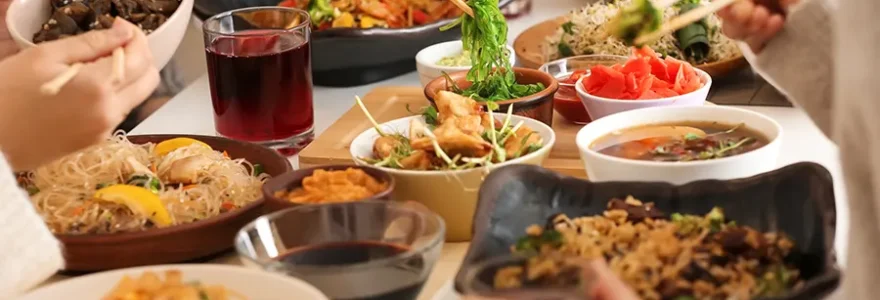During a stay in China, you may be invited to eat in a Chinese restaurant or host's house. The people of the Celestial Empire are very friendly. On the other hand, they are jealous of their customs and traditions. To avoid any mistakes, here are our China travel tips that tell you about the eating habits and manners of the Chinese.
Chinese gastronomy
Chinese cuisine is based on the principle of balance, yin and yang. Thus, each food can be either beneficial for the body or harmful for health. The balance is also based on flavour. In every dish, there are harmonious proportions of salt, sweet, spice, bitter and sour. The same applies to texture. A plate alternates between hot, warm, cold, soft and crunchy.
For cooking, the chefs prefer peanut or corn oil. The dishes are often drizzled with soy sauce, oyster sauce, shrimp noodles or rice wine. Dried mushrooms, black beans and bamboo shoots are added to the recipes to delight the taste buds.
As in all countries, the cuisine varies from one region to another in China. But our China travel tips recommend some specialities that stand out from the crowd, such as steamed bites, ravioli, sesame noodles, Peking duck...
Table manners
Chinese people enjoy being together at the table. Food is eaten with bamboo chopsticks, not with forks. Not tasting everything is frowned upon. Other China travel tips: at the end of the meal, say "che bao le" to signify that you are full. Also, emphasize how delicious everything was. Also, avoid tapping the glass with the cutlery before toasting. To make a "gambei" toast, it is better to hold your glass lower than your host. Indeed, Chinese people often stand up to make a toast, drinking bottoms up. If you have had enough to drink, put your finger on the glass to indicate that you do not want to be served again.
Rules of politeness
In China, politeness requires that shoes be removed when entering the home. Slippers are already provided by the hosts to be worn in the house. Failure to do so is considered rude.
Another important point: never get too familiar with a Chinese person, nor call them by their first name. This privilege is reserved for family members and close friends.
At the end of the meal, do not offer to help clear the table. Do not delay in leaving to relieve your host. Of course, don't forget to thank them.
